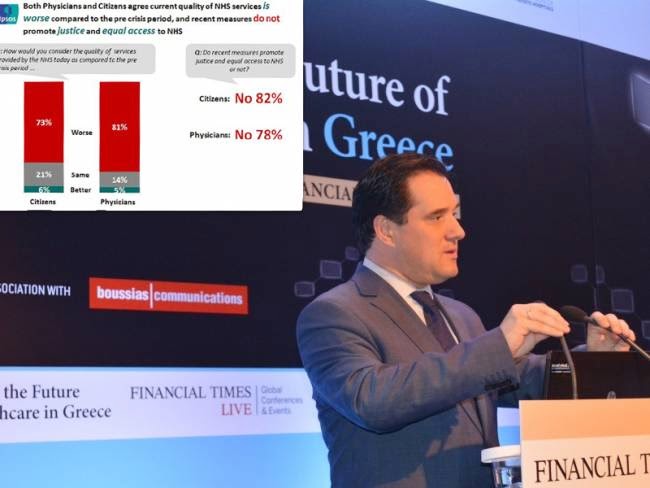The findings of the research by IPSOS Institute, which
focused on the last six months with the reforms of the Greek Ministry of Health still
taking place, are 'a slap in the face' of Mr. Adonis Georgiadis (Greek Minster of Health).
The research was presented by Ms Tina Tripsa, head of IPSOS
in Greece, at the conference of the Financial Times, which was held in
collaboration with the Greek Society of Health Services Administration and
Boussias Communications. The main theme of the conference was the economic
crisis and its impact on Health. The basic conclusion is the existence of deep
inequalities among Greek citizens regarding their access to health services and
the increase of the private expenditure of patients for their medical
treatment.
The survey was conducted during March in Athens, in
Thessaloniki and in various other Greek cities, through telephone and
face-to-face interviews. 624 Greek citizens took part, aged from 25 to 70
years, who have used health services in the last six months, either for
themselves or for their children, while 40% of the cases involved chronically
ill patients. 308 doctors from the NHS, EOPYY and the private sector
participated in the survey as well.
According to this research, it seems that those who have
been hit the most are the chronically ill. 71% of the patients who have lost
their public medical insurance rights while on long term treatment, will not be
able to go on with their treatment without having to pay for it in its
entirety, according to the doctors' estimates. Doctors consider that 29% of
them could continue their treatment if they turn to voluntary social services
such as community clinics. However, 44% of the chronically ill who have lost
their insurance are estimated to have their treatment already interrupted.
When asked "Have recent developments in the public
health sector affected your ability to follow your normal treatment -and if so,
in what way?" 4 out of 10 patients with chronic and rare illnesses have
answered "Yes".
40% continue with the treatment, however they have to pay
for their visits to the doctor.
26% missed certain doses.
25% had to pay out of their own pockets for medicines and
medical tests.
24% stopped taking accompanying drugs.
20% discontinued the therapy for a certain period of time.
As a result, in 33% of these patients there is disease
progression, 11% relapse and 14% show symptoms due to the discontinuation of
the accompanying drugs.
Compared to the period before the crisis, 56% say that today
their family pays more for health services, and 1 in 3 families “cut” from
their diet in order to cope with this increase in private expenditure.
During the last six months, the overwhelming majority of
Greeks had to pay extra for medicines or doctor visits, while doctors and
patients alike found that the quality of public health services today are worse
than the pre-crisis period and that the
recent measures of A. Georgiadis do not promote equal and fair access to the
public health system. Specifically, 73% of the citizens and 81% of the doctors
find the health services provided today worse, and 82% of the citizens and 78%
of the doctors consider that the recent measures do not improve access.
This is the depiction of the situation experienced by Greek
citizens in a health system rundown by austerity policies. As Ms Tripsa noted
in her presentation, equality in Health is a constitutional right, while the
creation or preservation of inequalities is due to the policies followed.
However, Mr. Georgiadis in his speech at the same
conference, praised once again those who are ministers "during the
memorandum era" and argued that "the real heroes of the times are the
ones that keep Greece standing -and we did so by saying 'yes' and not by
various trifle such as the 'heroic no' and the blackmail of Europe and the
like"... As for the claim that the whole world recognizes the progress of
the country besides the Greek journalists, the numbers of yet another research
seem to refute him.
Source (in Greek): http://www.isarkadias.gr/40550/uncategorized/vathies-anisotites-ke-chiroteres-ipiresies-igias-gia-tous-ellines/
METROPOLITAN COMMUNITY CLINIC AT HELLINIKO
Working Hours
(MONDAY - FRIDAY 10:00 - 20:00) and (SATURDAY 10:00 - 14:00)
CONTACT PHONE NUMBER: +30 210 9631950
ADDRESS: Inside the old American Military Base, 200m away from the Traffic Police of the Municipality of Helleniko, next to the Cultural Center of Helleniko
Post code TK16777, Elliniko, Attiki, Greece
Blog http://mkie-foreign.blogspot.gr/ Email mkiellinikou@gmail.com
Working Hours
(MONDAY - FRIDAY 10:00 - 20:00) and (SATURDAY 10:00 - 14:00)
CONTACT PHONE NUMBER: +30 210 9631950
ADDRESS: Inside the old American Military Base, 200m away from the Traffic Police of the Municipality of Helleniko, next to the Cultural Center of Helleniko
Post code TK16777, Elliniko, Attiki, Greece
Blog http://mkie-foreign.blogspot.gr/ Email mkiellinikou@gmail.com
